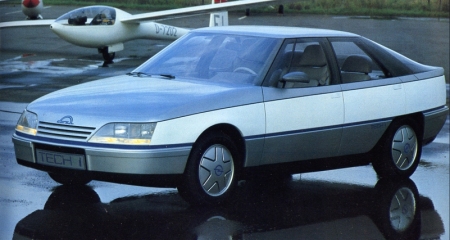1981 Opel TECH I Concept
- Jan 20, 2022
- 1 min read
The research vehicle TECH 1 was a further development that created a buzz at the IAA in 1981. The engineering study demonstrates Opel’s pioneering role in the field of aerodynamics: the experimental vehicle achieves a drag coefficient of 0.235, setting a world record. In terms of functionality and features, this four-door vehicle comprehensively and in usable form documented the automobile development of the future.
Less fuel consumption, high economic efficiency, versatility, and practical utility: those were the goals that the Opel designers and engineers set for TECH 1. Because the laws of physics cannot be ignored, aerodynamics will always remain a key factor in maximizing fuel economy. TECH 1 exemplifies excellent aerodynamics, preventing turbulences and ensuring greater efficiency in fuel consumption.
With a front fascia and a flowing silhouette that inspired the first Omega generation that premiered five years later in 1986, the TECH 1 set an aerodynamic benchmark with a drag coefficient of 0.235. Its exterior shape was designed in a wind tunnel with the help of computers. The all-around glazing runs flush with the car body. The glass even covers the roof pillars, avoiding an air vortex on the sides.
Its interior was just as ground-breaking: electronic digital instruments and touch keys controlled all functions except the brakes, gas, and clutch. Thanks to an advanced cooling and ventilation system and seating comfort and roominess, a distinct comfort awaits the driver and the passengers inside.
Source: www.opel.com
Images: GM

%20(4)_edited.png)




















































Comments